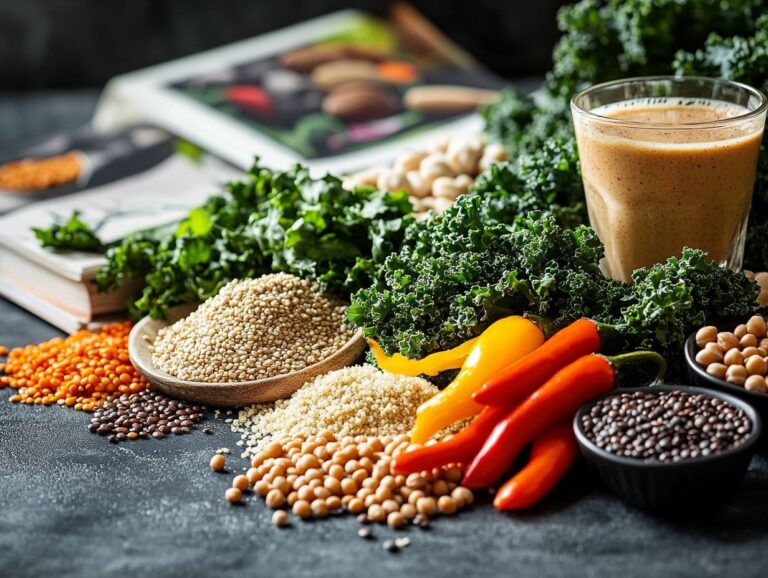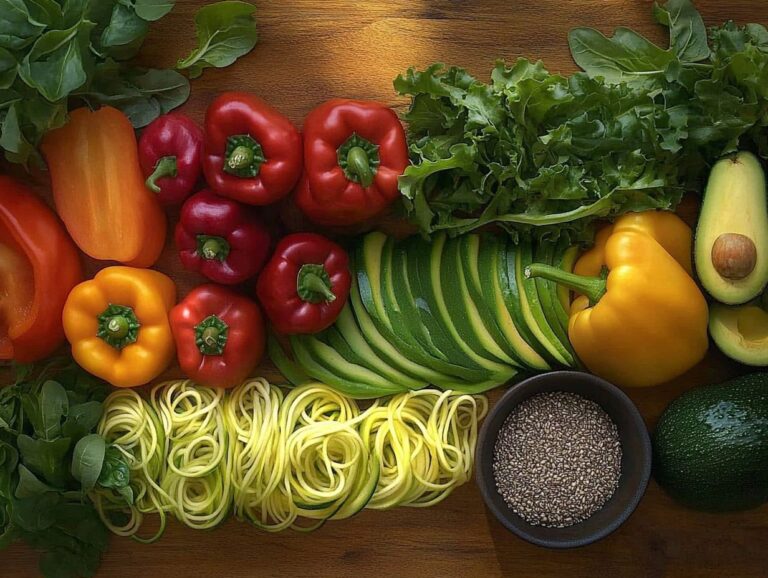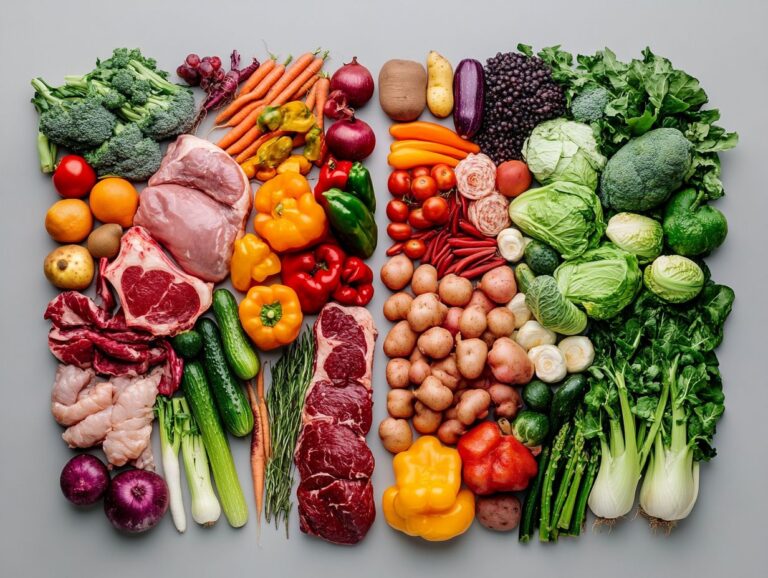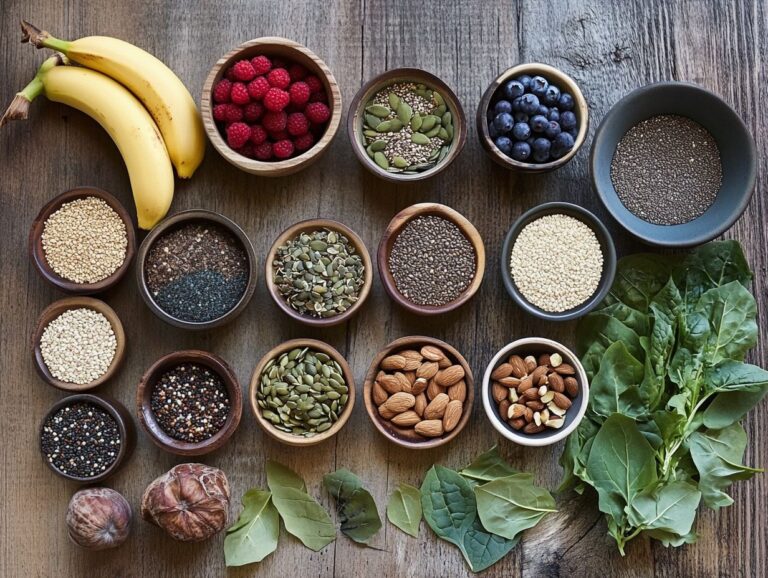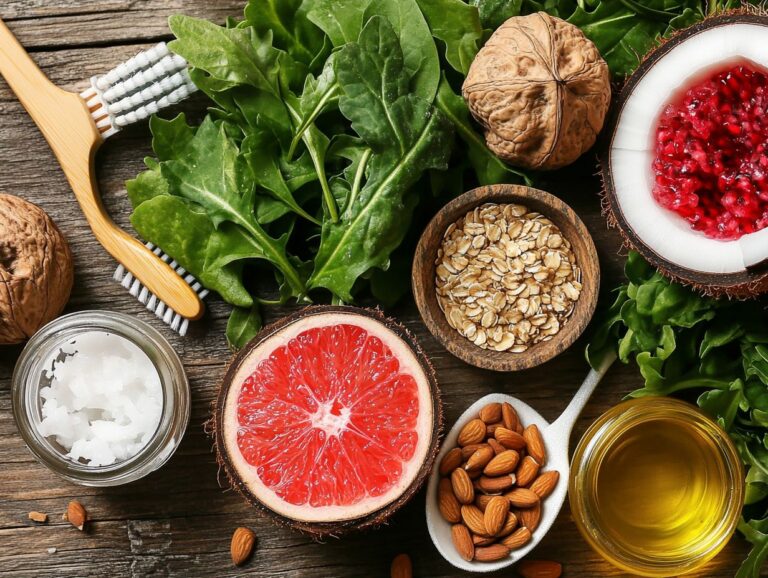In this article, you will discover how adopting a vegan diet can help you achieve your goals related to fat loss and muscle gain. It will cover the essentials of veganism, including what foods to include and what to avoid, as well as how to utilize plant-based foods for fitness purposes, including muscle building and achieving a calorie deficit. You will learn about the benefits of a vegan diet, such as its high fiber content and optimal nutrient absorption, while also being informed about common pitfalls to avoid, such as nutrient deficiencies. Throughout the article, practical advice will be offered on how to maintain the ideal balance in your vegan diet, ensuring nutritional adequacy.
Key Takeaways:
- A vegan diet can provide high fiber and plant-based protein for fat loss, while being low in saturated fats.
- For muscle gain, a vegan diet can offer high protein and lower inflammation, leading to better nutrient absorption.
- Achieve the perfect balance by calculating your macros, planning meals ahead, and incorporating strength training on a vegan diet.
What is a Vegan Diet?

A vegan diet is a plant-based diet that excludes all animal products, including meat, dairy, and eggs. By focusing on whole foods and essential nutrients, vegan diets promote healthy living and can help prevent conditions such as obesity, hypertension, and diabetes. Many athletes and strength athletes choose this diet for its health benefits.
Among the many celebrities who endorse this lifestyle are Arnold Schwarzenegger and the proponents of “The Game Changers” documentary, who have highlighted its effectiveness in achieving overall health and well-being.
Additionally, a vegan diet can support optimal body composition through adequate protein intake and nutritional balance, making it an appealing choice for both health-conscious consumers and athletes, including those focused on muscle strength and building muscle mass.
What Foods are Included in a Vegan Diet?
A vegan diet consists of a diverse array of plant-based foods, including fruits, vegetables, whole grains, legumes, nuts, avocados, and tofu, which are all excellent sources of dietary protein, essential nutrients, and antioxidants.
For instance, legumes such as lentils and chickpeas are rich in protein and high in fiber intake, promoting digestive health and helping to keep one feeling full for longer.
Nuts and seeds, like chia seeds and almonds, offer healthy fats along with a significant amount of protein, making them ideal snack options.
Whole grains such as quinoa and brown rice not only contribute to protein intake but also provide the carbohydrates necessary for energy, supporting athletes and strength athletes in their training.
Including foods such as tempeh and seitan is particularly important, as they supply concentrated levels of protein similar to that found in meat, thereby countering the misconception that a vegan diet cannot provide adequate protein levels for muscle building and maintaining muscle mass.
These varied sources help address potential concerns about nutrient deficiencies, resulting in a healthy and balanced diet that supports both weight loss and muscle building goals.
What Foods are Excluded in a Vegan Diet?
In a vegan diet, individuals refrain from consuming all foods that contain meat, dairy, eggs, and any other animal products. While this choice promotes ethical eating, it can also lead to nutrient deficiencies if not carefully managed.
The complete exclusion of animal products significantly affects the intake of essential nutrients, particularly vitamins such as B12, as well as iron, calcium, and omega-3 fatty acids, which are primarily found in animal sources. It’s important for those following a vegan diet to consider dietary supplements to ensure they meet their nutritional needs. For those who choose to adopt this diet, it is crucial to find adequate alternatives to fill these nutritional gaps in order to meet their dietary needs and maintain optimal health.
Fortified foods, plant-based proteins, leafy greens, and nuts can play essential roles in achieving this balance. People with dietary restrictions must be especially diligent in planning their meals to ensure they receive the necessary vitamins, minerals, and dietary protein, thereby fostering a healthy and balanced eating environment.
Benefits of a Vegan Diet for Fat Loss
The benefits of a vegan diet for fat loss are substantial. This diet can assist individuals in achieving a calorie deficit while offering high fiber content and being low in saturated fats, both of which are essential for effective weight loss and overall health.
1. High Fiber Content
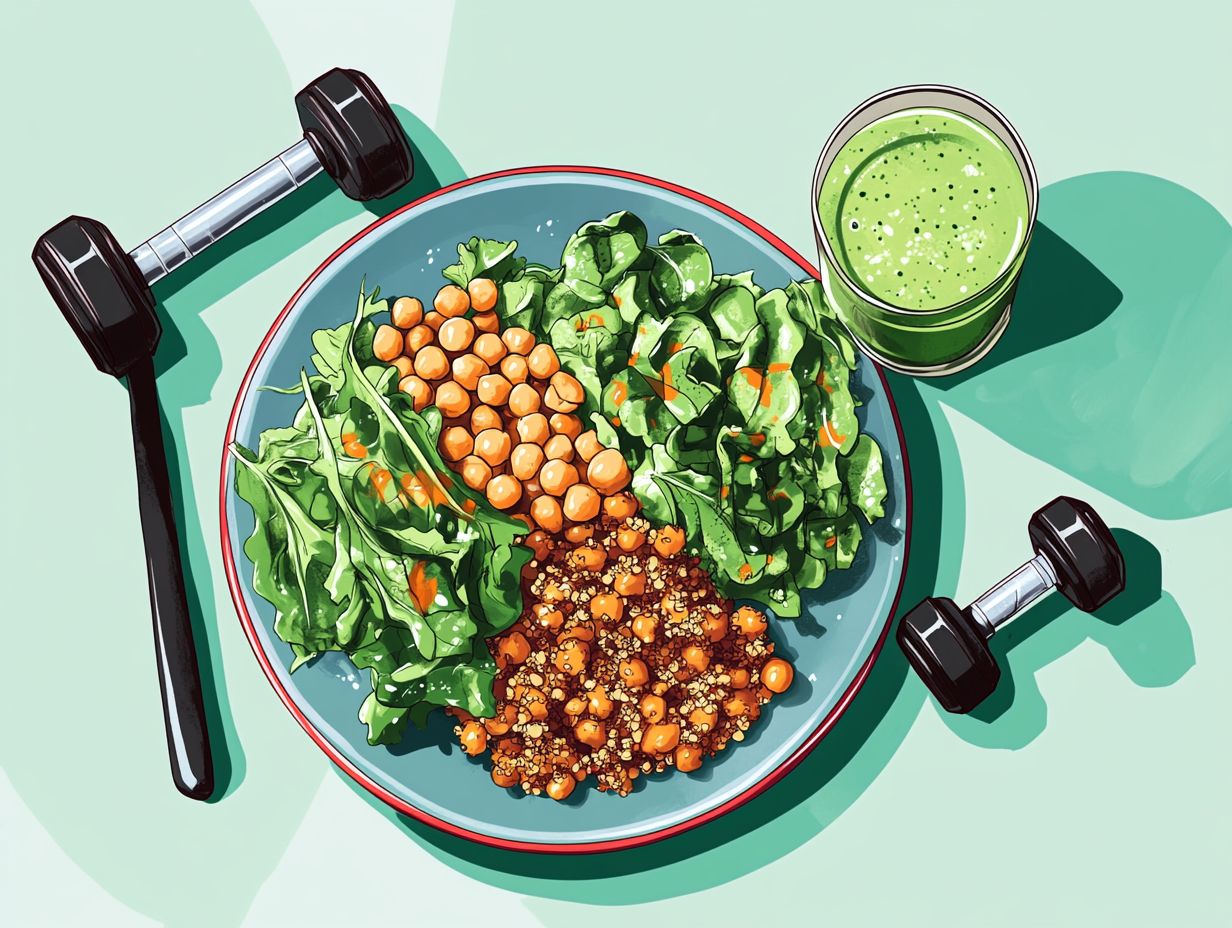
The most significant advantages of a vegan diet include the high levels of fiber found in plant-based foods, which can aid in weight loss by promoting a sense of fullness and reducing overall caloric intake.
This high fiber consumption not only helps maintain healthy digestion but also enhances the feeling of satiety. Plant-based foods such as beans, lentils, whole grains, fruits, and vegetables are excellent sources of dietary fiber and essential carbohydrates.
When consumed regularly, these high-fiber foods can promote gut health by supporting a healthy microbiome and ensuring regular bowel movements. Research indicates that a high fiber intake is important for managing body weight, as it is associated with reduced appetite and improved metabolic health.
Additionally, a diet rich in fiber contributes to overall well-being by lowering the risk of chronic diseases.
2. Low in Saturated Fats
A vegan diet is generally low in saturated fats, which may help prevent obesity and reduce the incidence of heart disease, contributing to better overall health and supporting weight loss efforts.
Research indicates that individuals following a vegan diet tend to have lower levels of LDL (low-density lipoprotein), commonly referred to as ‘bad’ cholesterol, a major contributor to heart disease. High fiber intake and low saturated fat are key components of this benefit.
According to a study published in the American Journal of Clinical Nutrition, vegans have cholesterol levels that are 15% lower than those adhering to traditional diets rich in animal products.
A meta-analysis across various populations has shown that lower saturated fat consumption is linked to a 30% reduction in heart disease. This evidence highlights the significant impact that a low saturated fat diet can have on improving health metrics and decreasing the prevalence of chronic diseases.
3. Plant-based Proteins
Plant-based proteins are a vital component of a vegan diet, as they provide the amino acids necessary for muscle strength and various bodily functions while serving as effective substitutes for traditional protein sources. These proteins are particularly important for individuals who wish to maintain muscle mass while following a plant-based diet.
Legumes, including lentils, chickpeas, and black beans, are rich in fiber and other nutrients that promote heart health.
- Nuts and seeds offer healthy fats along with high-quality protein, making them a nutritious addition to meals or a satisfying snack on their own.
- Tofu and tempeh, both soy-based proteins, can be incorporated into a variety of dishes, ensuring that vegans have access to diverse foods and protein sources.
To ensure adequate protein quality, it is crucial for vegans to combine different protein sources to achieve a complete amino acid profile, which is vital for muscle strength and recovery, especially after resistance training. This is necessary because most plant-based protein sources tend to lack certain essential amino acids or do not contain them in amounts comparable to animal-based foods.
Benefits of a Vegan Diet for Muscle Gain
A vegan diet is advantageous for muscle gain due to its high protein content, capacity to reduce inflammation, and positive impact on nutrient absorption—all of which are essential for muscle building, recovery, and maintaining a caloric surplus when needed for growth.
This dietary approach enables individuals to promote muscle mass development and body composition while minimizing the risks associated with consuming animal products.
1. High Protein Content
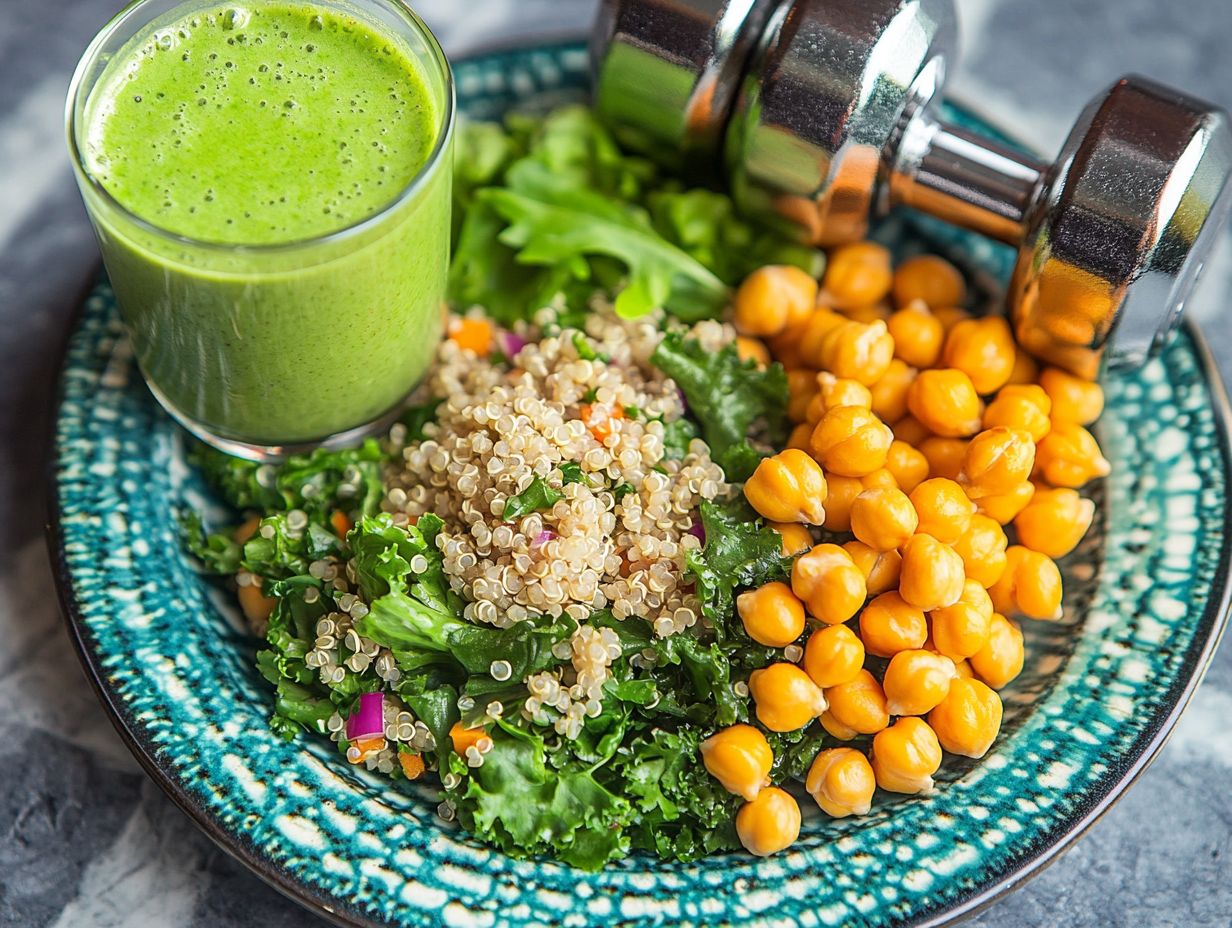
A high-protein vegan diet can be achieved through various sources of protein found in plant-based foods. These sources include legumes, grains, and nuts, all of which effectively support muscle mass development. A well-balanced diet incorporating these foods can help individuals looking to gain muscle meet their protein requirements.
For instance, lentils provide an impressive 18 grams of protein per cooked cup, while chickpeas contain approximately 15 grams per cooked cup. Quinoa is often referred to as a super grain because it includes all nine essential amino acids and offers 8 grams of protein per cooked cup. Additionally, nuts and seeds such as almonds and hemp seeds contribute healthy fats and deliver about 6 to 10 grams of protein each.
Research indicates that a protein intake of approximately 1.6 to 2.2 grams per kilogram of body weight is optimal for muscle recovery and growth, especially when combined with regular strength training.
2. Lower Inflammation
The anti-inflammatory effects of a vegan diet can enhance recovery times and overall health for those participating in resistance training. This dietary pattern focuses on whole, plant-based foods that are rich in antioxidants, vitamins, and minerals essential for muscle recovery.
For instance, foods such as berries, nuts, seeds, and leafy greens are packed with phytonutrients that help reduce oxidative stress and inflammation. Omega-3 fatty acids, found in flaxseeds and chia seeds, also contribute to reducing inflammation and promoting healing after intense workouts.
By incorporating these nutrient-dense foods into their meals, individuals not only support their recovery but also improve their overall performance and reduce their risk of injury, setting the stage for long-term fitness success.
3. Better Nutrient Absorption
A well-planned vegan diet enhances nutrient absorption and provides a variety of vitamins, antioxidants, and dietary protein essential for muscle recovery and overall well-being.
These nutrients, primarily found in fruits, vegetables, legumes, and whole grains, help reduce inflammation and oxidative stress, which can improve athletic performance. They are crucial for athletes and anyone engaged in regular physical activity, as adequate intake of these plant-based nutrients promotes endurance and shortens recovery time. Including high protein plant-based foods such as legumes and grains, like quinoa, can significantly enhance muscle building and muscle mass retention.
Additionally, a balanced diet strengthens the body’s ability to fight infections and ensures proper absorption and utilization of vitamins, antioxidants, and essential minerals, thus preventing nutrient deficiencies and promoting overall health benefits.
By choosing a diverse range of foods, including avocados and nuts, individuals can effectively support their wellness, maintain optimal body composition, and enhance their physical capabilities.
How to Achieve the Perfect Balance
Achieving the perfect balance on a vegan diet requires careful macro calculations, effective meal planning, and strength training to optimize protein intake and promote overall health. This approach is endorsed by athletes, including strength athletes, who benefit from the nutritional adequacy of a well-planned vegan diet.
1. Calculate Your Macros
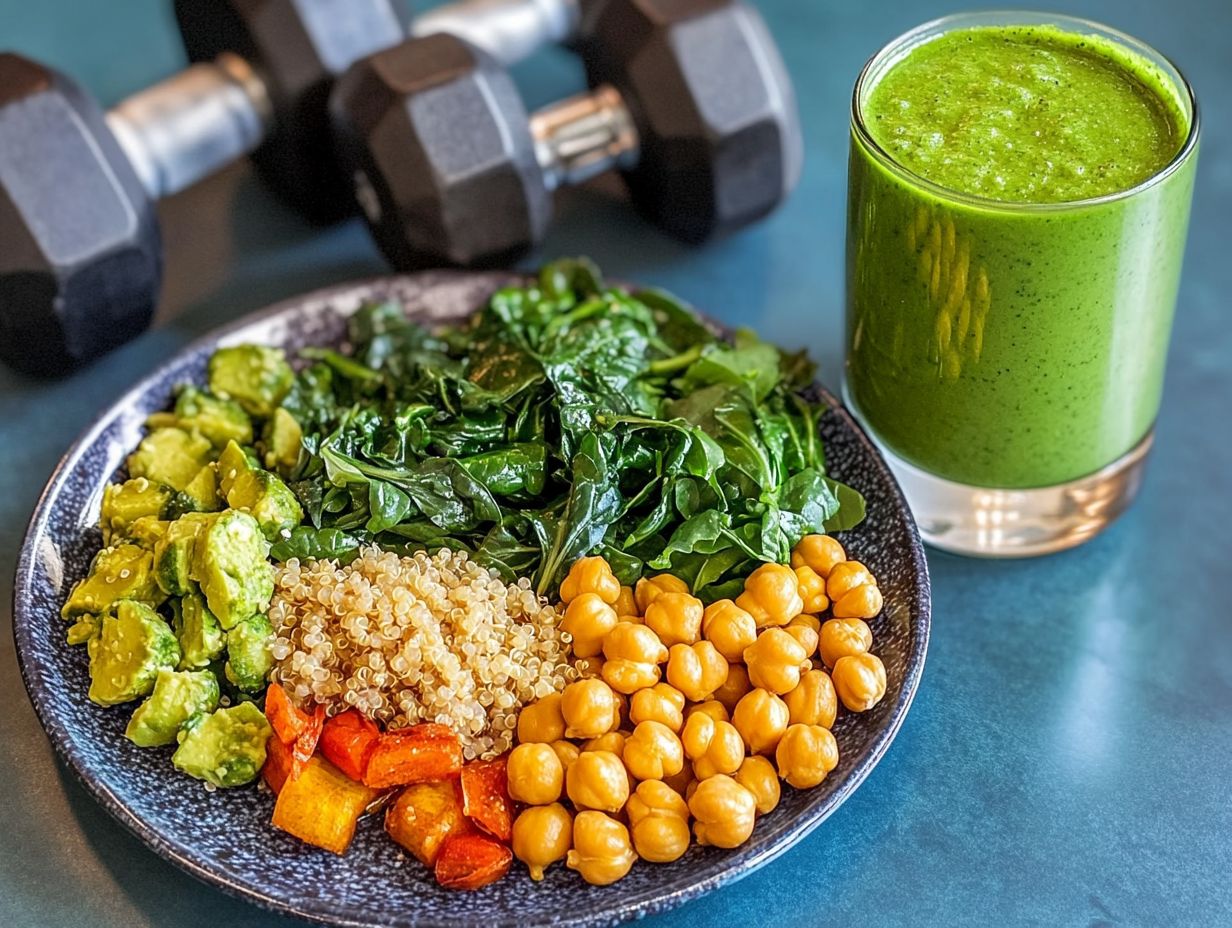
The significance of macronutrients in a vegan diet lies in the necessity to carefully monitor them to ensure individuals receive adequate protein and achieve either a caloric surplus or caloric deficit based on their specific fitness goals.
By understanding how to balance the three macronutrients—proteins, carbohydrates, and fats—individuals can tailor their daily diets to support their health objectives and energy levels. For instance, protein is essential for muscle repair and growth, while carbohydrates provide the energy needed for workouts and daily activities. Healthy fats are crucial for hormone production and overall cellular function.
To effectively track macro intake, individuals can utilize apps like MyFitnessPal or Cronometer, which facilitate easy monitoring of food intake and nutrient breakdown. Additionally, resources such as nutritional labels and online recipe analyzers offer valuable information on portion sizes and ingredient choices, helping individuals to create balanced, nutrient-dense meals that align with their specific goals.
2. Plan Your Meals Ahead
Meal planning is crucial for a vegan diet to ensure individuals receive a balanced intake of nutrients and avoid potential deficiencies, particularly in dietary protein.
Weekly menus should include a variety of protein sources to ensure proper dietary protein intake, such as:
- Legumes
- Quinoa and other grains
- Nuts
- Seeds
- Tofu
Recipes like chickpea curry, lentil salad, and tofu stir-fry are not only filling but also rich in essential amino acids. Additionally, smoothies can incorporate plant-based protein powders for added nutritional support.
By rotating different ingredients throughout the week, meals can remain exciting and enjoyable, helping individuals maintain a vegan lifestyle while meeting their daily protein needs and enhancing their overall health.
3. Incorporate Strength Training
To fully benefit from a vegan diet, it is essential to incorporate strength training, as it enhances muscle strength and supports optimal protein consumption. A regular program of resistance training enables individuals on a plant-based diet to effectively achieve muscle hypertrophy, helping them meet their fitness goals. Resistance training stimulates the production of proteins vital for muscle growth and aids in recovery after intense exercise.
To reach their dietary and fitness objectives, individuals following plant-based diets should focus on exercises that incorporate compound movements, such as:
- Squats
- Deadlifts
- Bench presses
These exercises promote overall strength development. Techniques like progressive overload and maintaining proper hydration can further optimize recovery times and enhance performance. Therefore, strength training is a crucial component of a well-rounded fitness plan.
Common Mistakes to Avoid on a Vegan Diet
The most common mistakes people make when transitioning to a vegan diet include:
- not obtaining enough protein,
- consuming too many processed foods,
- and failing to eat enough calories to meet their dietary and fitness goals.
1. Not Getting Enough Protein
One of the most common mistakes made on a vegan diet is the inadequate intake of protein, which can lead to muscle wasting and hinder fitness progress when appropriate protein sources are not consumed.
This oversight is often overlooked because many people assume that a plant-based diet will automatically provide sufficient protein. However, it is important to recognize that the amino acid profiles of plant foods differ, which can result in deficiencies if they are not combined properly. As highlighted in the documentary The Game Changers, even athletes like Arnold Schwarzenegger emphasize the importance of strategic protein intake on a plant-based diet.
To avoid this mistake, individuals should incorporate a variety of protein-rich foods, such as:
- Legumes
- Quinoa
- Nuts
- Seeds
Additionally, including higher-protein plant foods like lentils or chickpeas, as well as dietary supplements like pea or rice protein powders, is crucial for ensuring adequate protein intake. This approach is similar to the dietary habits of a silverback gorilla, which thrives on a plant-based diet.
2. Relying on Processed Foods
The potential dangers of a vegan diet include nutrient deficiencies and issues like obesity, hypertension, and diabetes that may arise when individuals adopt a diet overly reliant on processed foods, which can undermine the positive aspects of a plant-based lifestyle.
This situation often occurs because processed foods are convenient and readily available, yet they frequently lack essential nutrients, vitamins, minerals, and fiber. Many processed vegan options are high in added sugars, unhealthy fats, and sodium, which can contribute to health issues such as obesity and heart disease over time.
It is crucial to prioritize whole food alternatives, such as fresh fruits, vegetables, whole grains, legumes, nuts, and seeds. By focusing on these nutrient-dense options, individuals can enhance their diets, improve their overall health, and fully experience the benefits of plant-based eating.
3. Not Eating Enough Calories
Not consuming enough calories is a significant mistake when following a vegan diet, as it can lead to unintended weight loss and negatively impact body composition and energy levels. Balancing between a caloric surplus and calorie deficit is essential to meet dietary and fitness goals effectively.
Insufficient caloric intake may occur if individuals lack a clear understanding of their caloric needs, macronutrient balance, and suitable food choices within a vegan diet. Additionally, inadequate caloric intake can result from poor meal planning, insufficient tracking, and failing to incorporate energy-dense foods.
